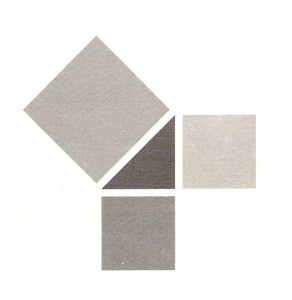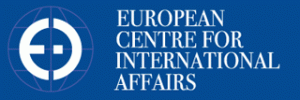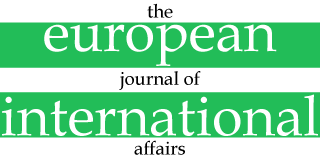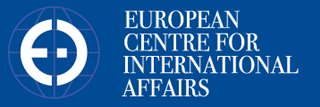About
The European Journal of International Affairs

Being in love – has written a French author – is not looking in each othe’r eyes, but looking in the same direction.
For much too long we Europeans have concentrated on the domestic affairs of our little continent, focusing more on what divides us than what unite us. But if we only turned to world affairs, we could easily see that we are confronted with the very same challenges and opportunities. And these are challenges which we can face only if we act together, opportunities that we cannot seize in isolation.
Looking together at the international scene is the very purpose of this Journal: giving a common perspective and a common voice to Europe. In so doing we might discover that a European view really does exist, and that it might be a valuable contribution to the global dialogue presently under way.
A Commitment to Rationality
Moral commitment and fidelity to our cultural heritage doesn’t conflict with applying the maximum of objectivity and rationality in the analyses of international affairs, and of reality in general.
If we deem that other peoples’ successes and tragedies concern us as well, it is also because we are convinced that there is neither inevitable conflict, nor incompatibility among cultures; that there are languages that are understood by everybody: the language of science, the language of independent research, the language of reason. This we see in the symbol of basic geometry: Pythagoras’s theorem.
The language of reason can enable us to communicate and find a common ground with any thinking creature. When around 1800, over two centuries ago, the idea became widespread that there could be intelligent life on other planets, notably on Mars, different ways of communicating were considered. A German amateur astronomer, by the name of Kros, proposed the construction of a giant lighthouse that would send intermittent signals in a rational way: first one blink, followed by a pause; the two blinks and a pause; then three and a pause, and so on. If in space there were thinking beings, the meaning of this series of rational numbers could not escape to them, and – allowing for the time necessary for the construction of a similar lighthouse – a response would certainly come from some other planet.
After a debate that lasted for about twenty years, an even better method of ascertaining the rationality of the hypothetical inhabitants of other planets was proposed. It consisted in lighting a giant series of fires in the Sahara, shaped to represent Pythagoras’s theorem. This was considered the quintessence of rationality. No living creature could defy the compelling logic it represents. Any thinking creature would recognise us as equals to him. Rationality is universal. If we could stick to it, no faiths, no ideologies, no opinions, no vested interests, no addiction to power positions could prevent a peaceful co-existence of the peoples of the creation.
Homo Sum, Humani Nihil a Me Alienum Puto
“I am a man, and nothing human is indifferent to me”.
This famous sentence by Terentius explains well the way in which a contemporary European observer cannot but look at world affairs, at all the tragedies and triumphs of mankind. L’idée de l’unité morale du genre humain, conçue par les philosophes grecs, avait passé chez les écrivains et les jurisconsultes latins.
To us Europeans, this is part of our classical legacy, as Terentius – the Roman author who wrote it – lived at a time when the Ancient World was on the brink of the Christian revolution, still had not personally converted.
But this is also part of our Christian culture, based on the idea of the moral unity of the entire human gender. And none but Saint Augustine calls Terentius’ words “a cry of nature”, and relates that “when first this beautiful verse was heard in Rome, a universal applause rose from the amphitheatre: hardly a single man who seemed insensitive could be found in such a large crowd, composed of Romans and the representatives of all the nations already subject or allied to their Empire”.
More recently, and more modestly, this truth has also inspired our modern secular philosophers, as Voltaire wrote that “C’est au genre humain qu’il eût fallu faire attention dans l’histoire ; c’est là que chaque écrivain eût dû dire : Homo sum, mais la plupart des historiens ont décrit des batailles“. Karl Marx considered these words “his favourite maxim”, and Alphonse Esquiros found that the time had come for the Nations to tell ”We are a people, and nothing that happens to other peoples can be indifferent to us”.
The European Centre for International Affairs
 The European Journal of International Affairs is edited by the The European Centre for International Affairs (ECIA).
The European Journal of International Affairs is edited by the The European Centre for International Affairs (ECIA).
ECIA is a Brussels-based independent, non-profit, policy think tank. The core mission is to provide innovative analyses of global issues from a European perspective.
Policymakers today are faced with the challenge of a complex and globalised politics in which resource, human and societal issues are inextricable. ECIA’s work is built on the belief that meeting these challenges sustainably in the long run requires reconciling Europe’s interests with its values.
The Research
The research is divided into geographical teams to ensure we always maintain a holistic perspective, and organised along three thematic clusters:
- Resources;
- People;
- Societies.
The groups working on specific projects are then divided into geographical teams to maintain a holistic perspective, and by thematic focus, primarily articulated around three cross-cutting themes:
- Sustainability;
- Governance;
- Globalisation.
Publications
Beyond the European Journal, the Centre disseminates his analysis and researches through various channels: briefings, analysis and policy papers, presentations and conferences, and outreach activities of its members staff. In particular, the Centre’s publications are actively involved in the editing of different types of papers intended to provide a wide range of analysis, from short articles to in-depth studies on several aspects of the European and international scenario. They are published to stimulate discussion by offering views and opinion on matters of general interest.
For more go to the Centre website: www.european-centre.org





